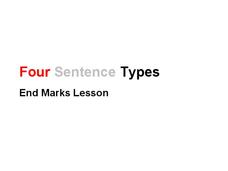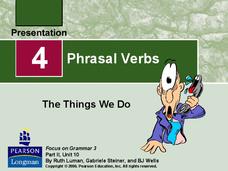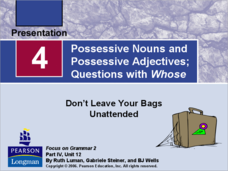Positively Autism
Pirate Vocabulary
Pirate ships and parrots, cannons and coins. Introduce learners with autism to pirate vocabulary with these pages that include an image and the printed vocabulary word.
E Reading Worksheets
Predictions Reading into the Future
Practice making inferences about fiction with a language arts slide show presentation. After kids read a few tips about ways to predict the next event in a story, they read several passages and try to find out what will happen next based...
Curated OER
Integers
Integers can be challenging, but this presentation makes teaching integers a whole lot easier! Comprehensive information, a song, chant, and pop quizzes provide an in-depth look into what integers are, and how to add, subtract, and graph...
Curated OER
Four Sentence Types: End Marks Lesson
Give sentence type instruction a boost with this informative powerpoint presentation! Learn about the four types of sentences; imperative, exclamatory, interrogative, and declarative, then check for understanding with a 10-question pop...
Henrico County Public Schools
Solving Systems of Equations Algebraically
Looking to review solving systems of equations algebraically? An educational slideshow presentation explains the methods of elimination and substitution, works through example problems, and provides practice problems.
Henrico County Public Schools
Solving Systems of Equations by Elimination
Eliminate the obvious. A series of slides presents algebra classes with step-by-step procedures for solving systems of equations using the elimination method. It provides an introduction to the elimination method for...
Pearson
Past Progressive and Simple Past
How do you describe something that was happening in the past? Use a presentation on past progressive tense to assist your class in finding the correct way to tell a story or write a description.
Curated OER
Analogy: Reasoning by Comparison
"Life is like a box of chocolates. . ." "Barack is a Mac, Hillary is a PC." Literal and figurative analogies are featured in a presentation that models how to use analogies to bolster arguments.
CFR Washington
Urbanization and Wildlife
Urbanization and how it affects wildlife is the focus of a presentation that uses statistics to make a case for concern and change.
E Reading Worksheets
Tone: Voice of the Speaker
Tone and mood are easy to use interchangeably—and yet they are very different elements of literature. Help middle schoolers discern between the way a speaker feels about his or her subject and the way the audience is meant to feel with a...
Pearson
Past Time
How do you talk about things that have already happened? What about things that happened in the past and are still happening? Explore past, past perfect, and past progressive verb tenses in a helpful slideshow presentation.
Pearson
Adjective Clauses
Encourage the knights and princesses in your class to practice adjective clauses and relative pronouns in a fairy tale-themed presentation! Several slides review the structure of sentences with adjective clauses before prompting your...
Pearson
Used To
Your class used to be confused about verb tenses, but now they understand more about the past tense! Practice the different ways to use used to in writing with a clear slideshow presentation, which includes negative and positive...
Pearson
Future Time Clauses
What will you do when you grow up? What are you going to do after school is over? Learn about future time clauses and how they connect to independent clauses with a helpful grammar presentation.
Pearson
Phrasal Verbs
When is a preposition not a preposition? Learn about the role prepositions play in a slideshow presentation about phrasal verbs. As the class watches the presentation, they reinforce their skills with practice activities.
Weebly
Adjectives in Spanish
Un presentación instructivo demonstrates proper Spanish grammar when adding adjectives in a sentence. Middle and high schoolers practice connecting adjectives to nouns with conjunctions, paying close attention to the...
Curated OER
Why Did Transatlantic Slavery Exist?
Looking for a quick introduction to the transatlantic slave trade? A student-produced presentation outlines the history behind European involvement in the triangle trade.
Hamilton Schools
Figurative Language
What's the difference between a simile and a metaphor? Show language arts learners a presentation that identifies different types of figurative language used in poetry.
Pearson
WH-Questions
Why can't you answer a wh- question with yes or no? Learn about the ways you can use the five W's to form questions that will give you the most information in an answer.
Urbana School District
Fluids
In 1879, Sir William Crookes discovered the fourth state of matter, plasma. The presentation covers states of matter, phase changes, density, pressure Pascal's Principle, buoyant force, Archimedes' Principle, Bernoulli's Principle,...
Pearson
Possessive Nouns and Possessive Adjectives; Questions with Whose
Be as possessive as you like with a grammar slideshow on possessive nouns and adjectives. Whether it's your suitcase, my suitcase, or his suitcase, elementary learners decipher the ways that possessive nouns and...
Pearson
The Simple Present: Affirmative and Negative Statements
The present tense is a helpful skill to review in any language arts classroom. Focusing on statements made in the affirmative and in the negative, a slideshow presentation guides pupils through grammar rules and examples for the simple...
Pearson
Subject and Object Pronouns; Direct and Indirect Object
Replacing a gift can end up in an awkward moment—but not when replacing a noun with a pronoun! Watch the most effective ways to use subject and object pronouns, as well as direct and indirect object pronouns, with an entertaining...
Pearson
Non-Action Verbs
A verb is something you do — but can you always see the action? Use a slideshow presentation to clarify the differences between verbs that describe actions, and verbs that describe senses, preferences, and emotions.
Other popular searches
- Food Groups
- Ethnic Groups
- Self Esteem Group Activities
- Mental Health Group Activity
- Group Work
- Cooperative Groups
- Equal Grouping
- Interest Groups
- Ethnic and Minority Groups
- Pe Games Large Groups
- Five Basic Food Groups
- Five Food Groups

























